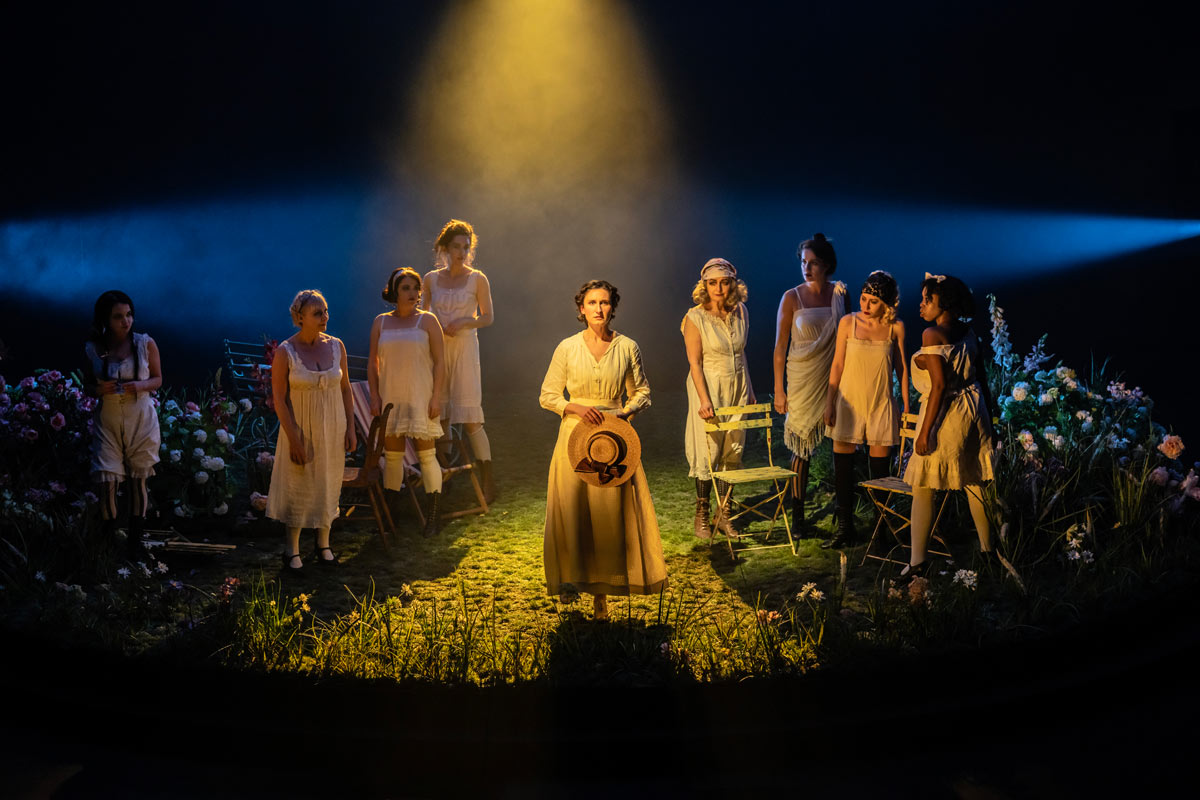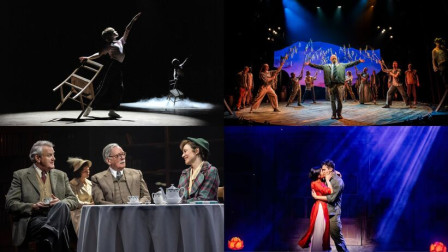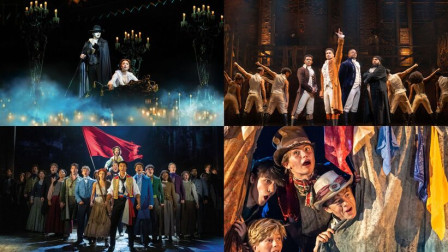Review: MRS WARREN’S PROFESSION at Garrick Theatre
George Bernard Shaw it seems, continues to divide opinion. Any revivals of his work invariably elicit strong assertions from those who perceive a throbbing visceral combativeness, whilst others sense only dullness. With Imelda Staunton headlining MRS WARREN’S PROFESSION at the Garrick opposite her real life daughter Bessie Carter, surely this once-banned warhorse from 1893 would draw both critical and box office success?
 Bessie Carter (Vivie Warren) in Mrs Warren's Profession - credit Johan Persson.
Bessie Carter (Vivie Warren) in Mrs Warren's Profession - credit Johan Persson.
RHS Chelsea is welcoming thousands of visitors this week, so it seemed entirely fitting to arrive in the stalls confronted by a stage awash with foxgloves, hollyhocks, astrantia and roses. The flowers ranged around a garden bench on a grassy circular playing area, truly pop amidst the otherwise inky slate grey backdrop of Chloe Lamford’s stylish set. On it, we encounter Cambridge educated Vivie (Bessie Carter) fresh fromNewnham where she has excelled at Mathematics. We learn through her conversation with Mr Praed (Sid Sagar) that she intends pursuing independence through a career combining her actuarial skills and the law. They discuss the imminent arrival of her mother, whilst her flippant on-off love interest Frank (Reuben Joseph) plays up to his wastrel reputation having recently squandered yet more of his father’s the Rev. Gardner’s meagre savings earned as vicar of the parish (Kevin Doyle). When Mrs Kitty Warren (Imelda Staunton) arrives, it is on the arm of her business partner Sir George Crofts (Robert Glenister) and over the next 24 hours, much is discussed, proposed and revealed about the nature of their arrangement and history.
Shaw wrote the play (one third of Plays Unpleasant) exposing and highlighting the hypocrisy endemic in Victorian society in relation to women, their social status, financial independence and commercial opportunities. Kitty Warren rose from her humble beginnings by managing successful brothels at a number of European cities, notably Brussels, Vienna and Budapest where the girls were treated well and everyone profited from the operation and the services offered. Whilst initially shocked but respectful of her mother’s forthright and businesslike tenacity, Vivie’s admiration wanes when she realises that the operation is very much a going concern and that her mother has no intention of ceasing the operation which has provided her livelihood.
Most of the other characters merely provide minor contextual support to the mother-daughter relationship, enabling Shaw to shine a spotlight on the seeming double standards and contradictions inherent in society’s condemnation of women whilst acknowledging the need for such services to exist.
Under Dominic Cooke’s direction, the highlights of the play are the confessional moments offering historical context for decisions and choices made. Best of these is Staunton’s explanation of Kitty’s early jobs and the lynchpin moment when she becomes reacquainted with her sister who refused to allow life to get the better of her.
Due undoubtedly to the corseted period in which it is set, the play occasionally feels didactic and a little pompous, but there is a great deal to like here, not least the truly believable generational and class clash between the two central women. Robert Glenister revels in the knowing and manipulative elements of his role and a troupe of shadowy young women clad in Victorian undergarments, add a weirdly disconcerting impact as sex workers of the period, gradually removing the aforementioned floral soft edges of the set as the play progresses.
MRS WARREN’S PROFESSION plays at The Garrick until 16 August.
Latest News

 This Month in the West End (February 2026)
27 February 2026 at 16:45
This Month in the West End (February 2026)
27 February 2026 at 16:45

 Cameron Mackintosh reveals extension periods for West End productions to 2027
27 February 2026 at 16:08
Cameron Mackintosh reveals extension periods for West End productions to 2027
27 February 2026 at 16:08

 TITANIQUE announces fourth extension
27 February 2026 at 15:55
TITANIQUE announces fourth extension
27 February 2026 at 15:55

 Florian Zeller’s Olivier Award-nominated comedy 'The Truth' to head to the West End this summer
27 February 2026 at 11:06
Florian Zeller’s Olivier Award-nominated comedy 'The Truth' to head to the West End this summer
27 February 2026 at 11:06
